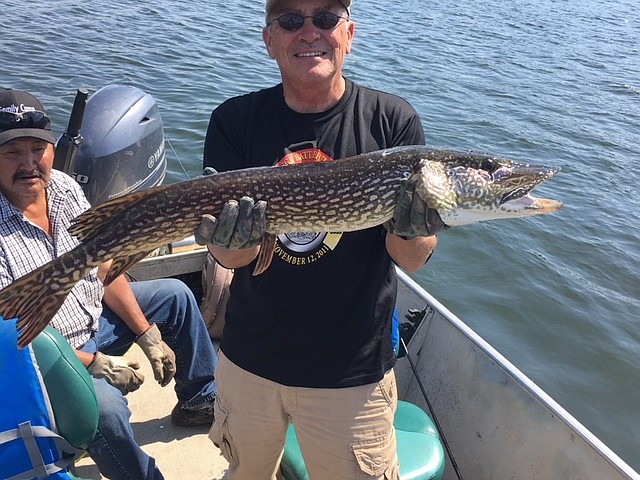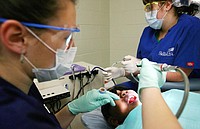My son and his friend recently invited me to join them and nine other friends on a four-day fishing trip to God's Lake in the upper part of the Canadian province of Manitoba. I went on the trip mostly to spend time with my son, who has matured into a busy husband, father, businessman, coach and church leader. We looked forward to spending time together, but God had more in store for us than the thrill of the best fishing in the world.
God's Lake has two well-staffed fishing lodges, Healey's and Elk Island. We chose Healey's, as some of our group stayed there before. During late spring, summer and early fall, there are no surface roads leading to God's Lake, so driving is not an option. We all flew to Winnipeg, then took a two-hour commercial flight to the community of God's Lake Narrows. Only during the freezing winter do ice roads connect God's Lake with the rest of Manitoba.
The area is populated primarily by Cree First Nation People, who have lived there since their ancestors from Siberia clamored over the ice bridge that connected Asia and North America 10,000 years ago. They named the huge lake on their shores Devil's Lake. It covers 444 square miles, compared with East Tennessee's Lake Chickamauga at 55 square miles. The Cree used the lake as their primary transportation routes, as land travel was very difficult. Often, during their lake crossings, sudden storms erupted, their canoes capsized and the occupants drowned in the cold dark waters; hence, the name Devil's Lake because it frequently claimed their loved ones.
However, in the early 1900s, Christian missionaries came to upper Manitoba and discovered a beautiful lake teeming with some of the best fish they had eaten. It also offered transportation to connect the isolated communities and help the missionaries spread the good news of Jesus Christ. Consequently, the missionaries convinced the locals to rename the lake God's Lake.
God's Lake Narrows, the area where Healey's Lodge is located, is a community of about 2,000 located where the massive northern and southern expanses of the lake are pinched by pine forests into a naturally deep channel. There are several stores, schools and a medical facility, and most of the population live in the Cree Reserve adjacent to Healey's Lodge.
We caught lake and brook trout, walleye and northern pike, but the pike were the most fun to catch. They are a much larger fish than walleye, and better eating (my opinion) than the trout. They also are an aggressive fish and have row upon row of razor-sharp teeth. My son caught a 2-foot northern pike, and just as he reeled it to the surface, a large 3-foot-plus pike sank its teeth into the smaller fish - one cast, two fish. When the northern pike hits a lure, one never knows what to expect, so the angler yells "Fish on!" to alert others in the boat.
Each day began with a hearty breakfast in the lodge at 6:30. We then met our guides and headed onto the water at 8. The little 18-foot aluminum boats with 40-horsepower engines were perfect for two anglers and a guide to zip around the lake and get into shallow waters. Around noon, the guides rendezvoused on an island. While the rest of us swapped stories (never let the truth get in the way of a good fish story) or went for a short hike, the guides prepared a delicious shore lunch of freshly filleted fish, potatoes, corn and beans - what a delight! After lunch, we fished until around 5, then headed back to the lodge.
During four days on the lake, we rarely saw another boat, building, power line or road. Other than our motors, the only noise was from loons, eagles and gulls. Miles upon miles of lake, sky, rocky shorelines and tall northern fir trees made a breathtakingly beautiful backdrop. Our Cree guides grew up in this environment and learned to appreciate it from their fathers and grandfathers who learned from countless generations before them.
For instance, our guide Fraser noted that a loon emitted an eerie yodeling sound as it flew past our bow. His grandfather once told him that sound meant the wind would be picking up. Within an hour, the winds began to blow, and we had a choppy ride in the little boat on our way back to the lodge.
Fraser also taught my son and me deeper lessons about life. He was one of many native people caught in the confusing transition from a culture that lived in tune with nature to one attempting to tame nature through civilization. Against the will of his parents, he was forced to leave home to attend a "residence" school in the 1960s when he was only 6 years old. Well-meaning people within the Canadian government decided if Cree children were taken from their families and educated properly, they would have a better future.
The resident school program didn't work. First, the schools tried to change the values the children were taught since birth instead of respecting and building on those values. Second, many children were abused physically and sexually by both government- and church-managed resident schools. Third, the experience left many Cree confused and skeptical of the God and values of white people who moved in and "took" their lands. It was (and still is) a complex and difficult problem that was beyond the government's ability to solve.
Like many of his peers, Fraser rebelled. He began drinking excessively and keeping bad company. He spent time in prison. After his release, he married and started a family, but he remained bitter and resentful. Then his wife began attending a small church on the Cree Reserve in God's Lake Narrows. She asked Fraser to read some of the verses in her English Bible and explain them to her. After a while, Fraser began to read the Bible for himself and decided he needed to understand it better. He went to church with her and became a Christian. I found his deep understanding of the Bible amazing, considering his lack of formal theological training, and his faith puts mine to shame.
Today, in addition to working as an excellent fishing guide, he is a lay minister and helps others overcome their fear and frustration with life as he did. His ministry is very important since drug use and the suicide rate among disillusioned Cree teenagers is very high. Hopefully, through Fraser's work and others like him, more Cree people can experience the love of God and find peace rather than losing hope in governmental bureaucracy intended to promote "progress."
God's Lake offered us far more than we expected, as Fraser's testimony led to some serious soul searching. Jesus taught us that some things are not possible through government programs or our own efforts, but everything is possible through faith in a God who loves us and forgives our transgressions. He taught his disciples to spread this good news as "fishers of men." I bet they got a thrill when the hopeless discovered hope, even more than we did when we heard the cry, "Fish on!"
Roger Smith, a local author, is a frequent contributor to the Times Free Press. Email him at capt.737@hotmail.com.


